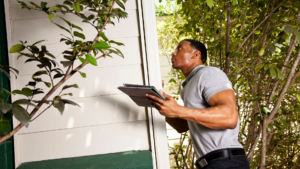 Your energy costs are determined by two factors: energy pricing and energy consumption. The first may be out of your control, but the second is not. Though you may not be aware of it, most homes leak energy, the result of natural deterioration. Many also contain outdated appliances, which consume significantly more electricity than newer models. A home energy audit identifies these issues, as well as ways to save money by improving your home and lowering energy bills.
Your energy costs are determined by two factors: energy pricing and energy consumption. The first may be out of your control, but the second is not. Though you may not be aware of it, most homes leak energy, the result of natural deterioration. Many also contain outdated appliances, which consume significantly more electricity than newer models. A home energy audit identifies these issues, as well as ways to save money by improving your home and lowering energy bills.
Why Hire an Energy Auditor?
Though it’s possible to conduct an energy audit on your own, a professional auditor generally produces more detailed and comprehensive results. Because most homeowners lack experience with home construction and design, they often overlook major areas of concern.
Professional auditors, on the other hand, are not only familiar with residential developments, their technology helps them zero in on critical weaknesses with far greater accuracy. Not to mention that their reports come with detailed, practical, and long-term solutions for the problems they uncover.
How Much Does a Home Energy Audit Cost?
Home energy audits start around $100 and can go as high as $1,000, though it’s rare for homeowners to spend more than $400-$500 on one. The price depends on several factors.
- Home Size. Assessing larger homes requires more time and effort than small ones. More rooms means there are more doors, windows, fixtures, and appliances for auditors to look at.
- Location. Houses in remote areas are harder to reach and therefore harder to audit. Homes in extreme climates generally require more intensive audits, which drives up the price. It may also be more expensive to audit homes in states and cities with strict housing regulations.
- Rebates. Some state and federal agencies offer financial incentives to homeowners interested in making their homes energy efficient. These may take the form of subsidies or tax breaks. An auditor can help you take full advantage of the programs available in your area.
However, when it comes to price, the biggest factor is the type of audit you need. There are three to choose from, based on the size of the investment you’re planning to make.
- Level one audits look for quick and simple upgrades. Based on interviews, visual inspections, and a review of your energy usage, auditors provide a list of low-cost improvements, often with the help of computer modeling.
- Level two audits provide a detailed and comprehensive overview of your home, with specific recommendations covering almost every aspect of your house, designed to produce significant savings but which have higher up-front costs.
- Level three audits lay the blueprint for a major overhaul, with costs broken down using complex energy models based on the detailed diagnostics gathered during a level two audit. Often includes projected energy savings, finance options and payback periods.
What Types of Tests Do Auditors Conduct?
Assessing freestanding appliances such as your dryer, dishwasher, and refrigerator is fairly straightforward. Based on their age, model, and condition, auditors can quickly calculate the amount of energy they consume and how much you could save by switching to a device that’s more efficient or has an ENERGY STAR rating.
By contrast, assessing climate systems is more complex. Auditors have to run tests on both your equipment and your home to determine whether you’re suffering from poor performance, poor insulation, or both. Standard tests include:
- Blower Door Test. Auditors mount a high-powered fan on an external door. Then, with the rest of your doors and windows shut tight, they draw the air out of your home, creating a vacuum that pulls outside air in through cracks and gaps, in order to identify air leaks.
- Duct Testing. The auditor forces air through your ventilation system with a fan. Then they compare the expected airflow with the actual airflow at various points in your ductwork to determine whether there are any leaks from damage, deterioration, or poor installation.
- Thermal Imaging. With an infrared camera, auditors scan your home to identify areas of heat loss, particularly in doors, windows, and trim.
- Temperature Differential. An auditor gauges the efficiency of your heating and cooling system by measuring the difference in temperature between your supply and return ducts. A large gap indicates subpar performance.
- Combustion Analysis. By testing the fumes coming up through the exhaust vent, auditors can determine whether the furnace is burning cleanly.
- Thermostat Testing. Ensures your thermostat is capable of detecting temperature changes and communicating with your heating and cooling systems.
Do You Need a Home Energy Audit?
Unless your house is newly built, a home energy audit will provide you with valuable information about how to lower energy costs. Older homes constructed without modern techniques and technology are often full of costly inefficiencies. Signs your home could benefit from an audit include:
- Rising utility costs
- Persistent drafts
- Cold Walls
- Uneven temperatures between rooms
- Melted snow on the roof
- Icicles hanging off your gutters
- Condensation on windows
While a home energy audit won’t save money on its own, it’s an important first step. Once you know the additional steps you need to take, you can create a plan to cut costs. By some estimates, as much as 20 percent of household energy is wasted due to old appliances, poor maintenance, and bad insulation. Keep in mind that though many of the investments recommended by a home energy audit are expensive, in the long run they pay for themselves with lower bills and greater comfort.